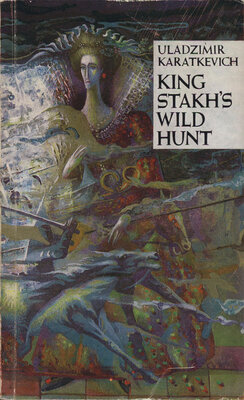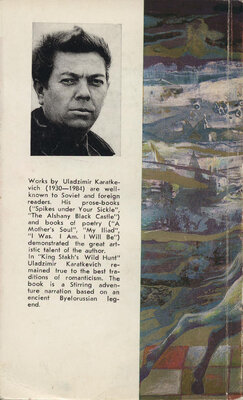King Stakh's Wild Hunt
Уладзімір Караткевіч
Выдавец: Мастацкая літаратура
Памер: 248с.
Мінск 1989
an agreement with the author of the letter. There he was taken for me and the tragedy occurred, a tragedy to which I had become a belated witness.
And the dwarf had sat all these days in the passages, lacking the strength to get out, and had become entirely weakened by hunger.
If I hadn’t opened the door, he would probably have died of hunger without having guessed why his brother had left him, his brother who always fed him and caressed him.
What was I to do with him? The unfortunate fellow was not guilty that he was born such a creature into this world. Here he disappears from our story. I fed him, informed Yanowskaya of the death of one of the ghosts inhabiting the castle, and on the following day sent him off to the district hospital for the weak-minded.
And for the first time I saw hope beginning to shine in the eyes of the mistress of Marsh Firs, and although the light in them was tender, it was as yet but weak.
CHAPTER THE SEVENTEENTH
“Is that you, Rygor?”
“Me, Andrei. More exactly, us.”
I held out my hand to Rygor. This night was the first cloudless and moonlit night that we’d had in a long time. The full moon cast a bluesilver light over the peat-bogs the waste land, the Marsh Firs Park and far, far away it shone in a little window of some lonely hut. The night had become a cold one, and now the swamps were “sweating”, giving birth to a mobile white fog in the hollows.
Rygor stepped out from among the bushes
growing at the broken-down fence, and people appeared behind him in the darkness, about twelve in all.
They were muzhiks. All of them in leathercoats turned inside out, in identical white felt hats.
And they all looked alike in the moonlight: as if the earth itself had simultaneously given birth to them. I saw that two of them had long guns the same as Rygor’s. A third held a pistol in his hand, the rest were armed with boarspears and pitchforks, and one had an ordinary club.
“Who are they?” I asked in surprise.
“Muzhiks,” Rygor said. “Our patience is exhausted. Two days ago the Wild Hunt trampled to death the brother of this muzhik. His name’s Mikhal.”
Mikhal had deep little eyes, high cheekbones, beautiful paws, more so than Dubatowk’s. His eyes were red and swollen, and his hands gripped his gun so hard that the knuckles of his fingers had even turned white. He looked gloomy and sullen, but clever.
“Enough’s enough!” Rygor said. “The only thing left for us to do is to die. But we don’t want to die. And you, Belaretzky, if anything is not to your liking, keep quiet. This is our affair. And God allows the whole world to rise against the horse-thief. Today we’ll teach them not only not to trample the people, but even not to eat bread. These people with Mikhal at their head will remain here under your command. Mine are waiting for me at the swamp that surrounds the Yanowsky Virgin Forest near the Witch’s mortar. There are twenty more of them there. If the Hunt comes there — we’ll meet them, if they take another road unknown to us — you’ll meet
them. We’ll keep watch at the Virgin Forest, the Cold Hollow and the waste lands that are next to us. If you need help, send a man.”
And Rygor disappeared into the darkness.
We arranged an ambush. I instructed six muzhiks to take their places along both sides of the road at the broken-down fence, and three somewhat farther on, thus forming a sack. In case anything should happen, the three would have to block the way to retreat for the Wild Hunt. I took my place behind the large tree by the very path.
I forgot to say that for each one of us there were three torches. Quite enough, in case of need, to light up everything around us.
As my people in leather coats lay down, they merged with the earth — they couldn’t be distinguished from the hummocks, their grey sheepskins became one with the beaten down autumn grass.
In this way we waited quite a long time. Above the marshland floated the moon, from time to time some blue sparks flashed there, the fog sometimes became a compact, low sheet up to the knees, sometimes it slowly moved away again.
They, as always, appeared unexpectedly. Twenty misty horsemen on twenty misty horses. Their approach noiseless and terrifying. A silent mass moved on us. The bits did not ring, no human voices were heard. Capes were waving with the wind. The Hunt was dashing on. And at its head raced King Stakh, his hat, as previously, pulled down over his face. We had expected them to come flying with the wind, but at about a hundred steps away they dismounted, spent much time near the horses’ hoofs. When they moved on again, an altogether unexpected
thunder of hoofs reached us, breaking into the silence.
Slowly they came nearer and nearer to us, they were already passing the quagmire and were riding up to the fence, but here they passed round it. Stakh came riding straight towards me, and I could see his face, a face white as chalk.
When he was almost at my tree, I stepped forward, took his horse by the bridle. Simultaneously — with my left hand in which I clutched the riding-crop,— 1 moved his hat onto the back of his head.
It was Varona’s face I saw — a face pale as death, eyes without a living light in them, large dead eyes.
So unexpected it was that he certainly did not know what to do, but I, to make up for it, knew very well what I should do.
“So you are King Stakh?” I asked quietly, and hit him in the face with the riding-crop.
Varona’s horse reared and dashed away from me into the group of horsemen.
At that very instant the guns thundered from the ambush, the torches blazed, and everything was in a whirl in a mad sea of fire. The horses reared, the horsemen fell, someone yelled in a heart-rending voice: I still remember only Mikhal’s face as he cold-bloodedly took aim. A cone of bullets flashed out from a long gun. Then a young man’s face floated in front of me, the face of that man with high cheek-bones; his long tresses of hair were falling down his forehead. The fellow was working with a pitchfork as on a threshing floor, then lifted it and with terrific strength thrust it into the belly of the rearing horse. The horseman, the horse, and the man fell down together. But I remained standing, and in spite of the fact that shots were
already coming also from the Hunt, and that bullets were whistling overhead, I deliberately chose whom to shoot at from among the horsemen energetically surrounding me. Shots came pouring on them also from behind.
“Brothers, treachery!”
“Our galloping is over!”
“Save us!”
“Oh, Lord! Oh, Lord!”
I saw fear on the faces of these bandits, and the joy of revenge took possession of me. They should have thought beforehand that the day of reckoning would come. I saw the muzhik with the club breaking into the thick of the fight, beating violent strokes with it. All the old fury, all the long-suffering now exploded in an attack of unheard of passion and fighting bravery. Somebody jerked off one of the hunters from his saddle and the horse dragged his head by the roots.
Within ten minutes all, in fact, was over. The riderless horses neighed horribly, the killed and wounded lay like sheaves on the ground, Varona alone, like the devil, dodged about among the muzhiks, beating them off with a sword. His revolver he clutched between his teeth. He fought splendidly. Then he saw me. His face became distorted with such terrible hatred, that even now I remember it, and sometimes see in my dreams.
Having trampled down one of the peasants with his horse, he grabbed his revolver.
“Beware, you villain! You’ve taken her away from me! But there’ll be no caresses for you!”
The peasant with the long whiskers pulled him by a leg and due only to that I didn’t crash to the ground with a hole in my skull. Varona understood he would be pulled off his
horse now, and firing point-blank, he killed the long-whiskered man on the spot.
And then I, having succeeded in reloading my revolver, sent all the six bullets into him. Varona, grasping at the air with his hands, reeled in his saddle, but nevertheless turned his horse around, knocked the high-cheek-boned man to the ground and dashed off in the direction of the swamp. He was all the time grasping at the air with his hands, but stayed in the saddle and together with it (the saddle-girth must have broken) slid down the side until he was hanging over the ground. The horse turned aside. Varona’s head struck heavily against a stone post in the fence.
Varona flew out of his saddle, struck against the ground and remained lying motionless, dead.
It was a crushing defeat. The terrible Wild Hunt was overcome by the hands of ordinary muzhiks on the very first day that they exerted themselves a little and began to believe that with pitchforks they could rise even against phantoms.
I examined the battlefield. The peasants were leading the horses off to the side. They were real Polessye dryckgants. All striped and with spots, with white nostrils, with eyes in whose depths a red flame blazed. Not surprising then that their capering in the fog seemed so unnatural, for I knew that this breed was distinguished for its remarkably long strides.
And unexpectedly two more riddles were solved. Firstly, four sheepskin bags hung at the saddle of each of the hunters. In case of need they could be put on the horses’ hoofs and tied at the pasterns. Their steps became entirely noiseless. Secondly, among the dead and the wounded I saw three scarecrows on the
ground that were dressed like the hunters, but they were tied to their saddles with ropes. Evidently, Varona did not have enough people.
However, our losses were also heavy ones. We'd never have conquered this band of professional murderers if our attack had not been so unexpected. But even as it was, our results were bad: the muzhiks just could not fight. The fellow with the prominent cheek-bones who was knocked down by Varona’s horse, lay with his head smashed. The long-legged muzhik had a bullet hole darkening in the very middle of his forehead. The muzhik with the club lay on the ground, his feet jerking: he was dying. Of the wounded there were twice as many. I also received a wound. A bullet at the rebound had flicked me in the back of my head.
 КНІГІ ОНЛАЙН
КНІГІ ОНЛАЙН


